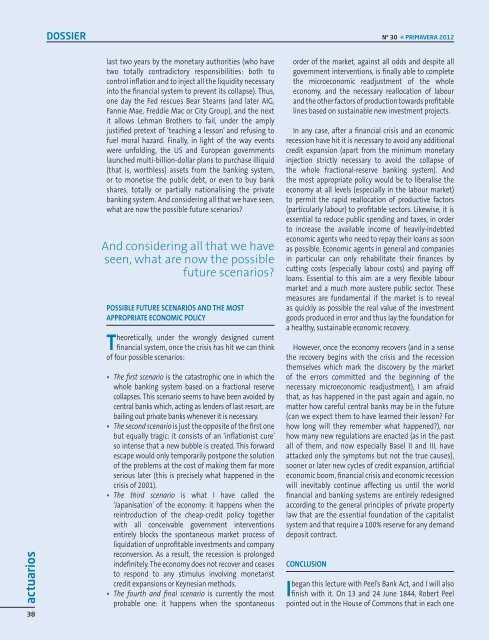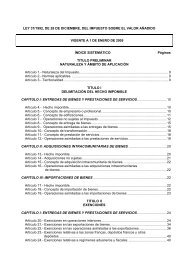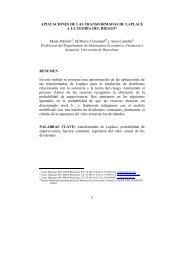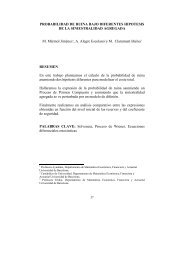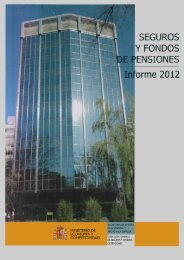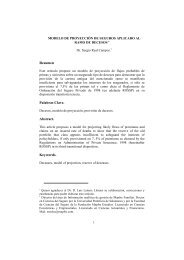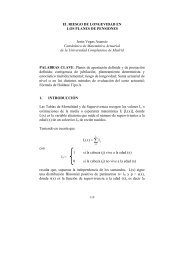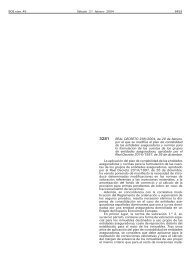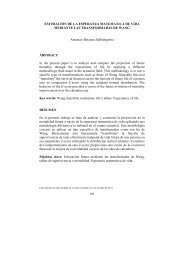REVISTA COMPLETA (pdf) - Instituto de Actuarios Españoles
REVISTA COMPLETA (pdf) - Instituto de Actuarios Españoles
REVISTA COMPLETA (pdf) - Instituto de Actuarios Españoles
You also want an ePaper? Increase the reach of your titles
YUMPU automatically turns print PDFs into web optimized ePapers that Google loves.
DOSSIER Nº 30 ■ PRIMAVERA 2012actuarios38last two years by the monetary authorities (who havetwo totally contradictory responsibilities: both tocontrol inflation and to inject all the liquidity necessaryinto the financial system to prevent its collapse). Thus,one day the Fed rescues Bear Stearns (and later AIG,Fannie Mae, Freddie Mac or City Group), and the nextit allows Lehman Brothers to fail, un<strong>de</strong>r the amplyjustified pretext of ‘teaching a lesson’ and refusing tofuel moral hazard. Finally, in light of the way eventswere unfolding, the US and European governmentslaunched multi-billion-dollar plans to purchase illiquid(that is, worthless) assets from the banking system,or to monetise the public <strong>de</strong>bt, or even to buy bankshares, totally or partially nationalising the privatebanking system. And consi<strong>de</strong>ring all that we have seen,what are now the possible future scenarios?And consi<strong>de</strong>ring all that we haveseen, what are now the possiblefuture scenarios?POSSIBLE FUTURE SCENARIOS AND THE MOSTAPPROPRIATE ECONOMIC POLICYTheoretically, un<strong>de</strong>r the wrongly <strong>de</strong>signed currentfinancial system, once the crisis has hit we can thinkof four possible scenarios:• The first scenario is the catastrophic one in which thewhole banking system based on a fractional reservecollapses. This scenario seems to have been avoi<strong>de</strong>d bycentral banks which, acting as len<strong>de</strong>rs of last resort, arebailing out private banks whenever it is necessary.• The second scenario is just the opposite of the first onebut equally tragic: it consists of an ‘inflationist cure’so intense that a new bubble is created. This forwar<strong>de</strong>scape would only temporarily postpone the solutionof the problems at the cost of making them far moreserious later (this is precisely what happened in thecrisis of 2001).• The third scenario is what I have called the‘Japanisation’ of the economy: it happens when thereintroduction of the cheap-credit policy togetherwith all conceivable government interventionsentirely blocks the spontaneous market process ofliquidation of unprofitable investments and companyreconversion. As a result, the recession is prolongedin<strong>de</strong>finitely. The economy does not recover and ceasesto respond to any stimulus involving monetaristcredit expansions or Keynesian methods.• The fourth and final scenario is currently the mostprobable one: it happens when the spontaneousor<strong>de</strong>r of the market, against all odds and <strong>de</strong>spite allgovernment interventions, is finally able to completethe microeconomic readjustment of the wholeeconomy, and the necessary reallocation of labourand the other factors of production towards profitablelines based on sustainable new investment projects.In any case, after a financial crisis and an economicrecession have hit it is necessary to avoid any additionalcredit expansion (apart from the minimum monetaryinjection strictly necessary to avoid the collapse ofthe whole fractional-reserve banking system). Andthe most appropriate policy would be to liberalise theeconomy at all levels (especially in the labour market)to permit the rapid reallocation of productive factors(particularly labour) to profitable sectors. Likewise, it isessential to reduce public spending and taxes, in or<strong>de</strong>rto increase the available income of heavily-in<strong>de</strong>bte<strong>de</strong>conomic agents who need to repay their loans as soonas possible. Economic agents in general and companiesin particular can only rehabilitate their finances bycutting costs (especially labour costs) and paying offloans. Essential to this aim are a very flexible labourmarket and a much more austere public sector. Thesemeasures are fundamental if the market is to revealas quickly as possible the real value of the investmentgoods produced in error and thus lay the foundation fora healthy, sustainable economic recovery.However, once the economy recovers (and in a sensethe recovery begins with the crisis and the recessionthemselves which mark the discovery by the marketof the errors committed and the beginning of thenecessary microeconomic readjustment), I am afraidthat, as has happened in the past again and again, nomatter how careful central banks may be in the future(can we expect them to have learned their lesson? Forhow long will they remember what happened?), norhow many new regulations are enacted (as in the pastall of them, and now especially Basel II and III, haveattacked only the symptoms but not the true causes),sooner or later new cycles of credit expansion, artificialeconomic boom, financial crisis and economic recessionwill inevitably continue affecting us until the worldfinancial and banking systems are entirely re<strong>de</strong>signedaccording to the general principles of private propertylaw that are the essential foundation of the capitalistsystem and that require a 100% reserve for any <strong>de</strong>mand<strong>de</strong>posit contract.CONCLUSIONbegan this lecture with Peel’s Bank Act, and I will alsoI finish with it. On 13 and 24 June 1844, Robert Peelpointed out in the House of Commons that in each one


